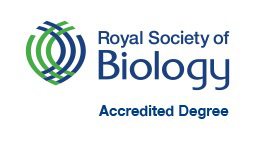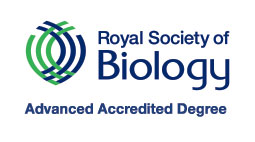Biology Code C109 Attend an Open Day Attend an Open Day Clearing places available – 0800 121 40 80
Apply NowYou are viewing this course for September start 2024
Key Facts
C109-
UCAS Tariff
128 - 120
-
Course duration
4 years
Further details on entry requirements
Apply NowIf you are fascinated by all aspects of the living world, you will thrive on our MBiol Biology degree course here at Aberystwyth University. By choosing the MBiol degree scheme, you will combine a BSc with an extra year of study to graduate with a Masters qualification. During the three years studying at undergraduate level, you will explore a whole host of diverse topics that cover the cellular and molecular up to whole organisms. During your final year studying at Masters level, you will have the opportunity to apply your subject-specific knowledge and understanding to an independent scientific research project conducted in close collaboration with one of our research groups. Join us on our exciting MBiol Biology degree course and you will develop the breadth and depth of biological knowledge required to pursue a career as a professional scientist, and you will find that Aberystwyth is one of the best places in the world to explore our wonderful living world.
Course Overview
Modules September start - 2024
Please note: The modules listed below are those currently intended for delivery during the next academic year and may be subject to change. They are included here to give an indication of how the course is structured.
| Module Name | Module Code | Credit Value |
|---|---|---|
| Cell Biology * | BR17520 | 20 |
| Comparative Animal Physiology | BR16720 | 20 |
| Ecology and Conservation * | BR19320 | 20 |
| Genetics, Evolution and Diversity | BR17120 | 20 |
| Microbial and Plant Diversity * | BR19920 | 20 |
| Skills for Biologists * | BR16820 | 20 |
| Module Name | Module Code | Credit Value |
|---|---|---|
| Climate Change: Plants, Animals and Ecosystems | BR21120 | 20 |
| Evolution and Molecular Systematics | BR21720 | 20 |
| Practical and Professional Skills in Microbiology | BR24720 | 20 |
| Research Methods * | BR27520 | 20 |
Options
| Module Name | Module Code | Credit Value |
|---|---|---|
| An Introduction to Landscape Ecology and Geographic Information Systems | BR25520 | 20 |
| Applied Molecular Biology and Bioinformatics | BR20620 | 20 |
| Cell and Cancer Biology | BR25920 | 20 |
| Chromosome Dynamics | BR21820 | 20 |
| Controlled Environment Crop Production and Horticulture | BR23520 | 20 |
| Ecological Surveying | BR21420 | 20 |
| Freshwater Biology | BR22020 | 20 |
| Invertebrate Zoology | BR25420 | 20 |
| Marine Biology | BR22620 | 20 |
| One Health Microbiology | BR26520 | 20 |
| Proteins and Enzymes | BR26620 | 20 |
| Tropical Zoology Field Course | BR23820 | 20 |
| Vertebrate Zoology | BR26820 | 20 |
| Module Name | Module Code | Credit Value |
|---|---|---|
| Biotechnology | BR35520 | 20 |
| Global Biodiversity Conservation | BR33420 | 20 |
| Research Project * | BR36440 | 40 |
Options
| Module Name | Module Code | Credit Value |
|---|---|---|
| Bioinformatics and Functional Genomics | BR37120 | 20 |
| Fish Biology, Fisheries and Aquaculture | BR33220 | 20 |
| Frontiers in Plant Science | BR35820 | 20 |
| Microbial Pathogenesis | BR33720 | 20 |
| Parasitology | BR33820 | 20 |
| Terrestrial Ecology Fieldcourse | BR36620 | 20 |
| Wildlife Conservation | BR34520 | 20 |
| Module Name | Module Code | Credit Value |
|---|---|---|
| Field and Laboratory Techniques | BRM4820 | 20 |
| Frontiers in the Biosciences | BRM4920 | 20 |
| MBiol Research Project | BRM2860 | 60 |
| Research Methods in the Biosciences | BRM6420 | 20 |
* Also available partially or entirely through the medium of Welsh
Careers
Teaching & Learning
Typical Entry Requirements
UCAS Tariff 128 - 120
A Levels ABB-BBB with B in Biology or Human Biology
GCSE requirements (minimum grade C/4):
English or Welsh, Mathematics and a Science subject
BTEC National Diploma:
BTEC not accepted for this scheme
International Baccalaureate:
32-30 points overall with 6 points in Biology at Higher Level
European Baccalaureate:
75% overall with 7 in a relevant science
English Language Requirements:
See our Undergraduate English Language Requirements for this course. Pre-sessional English Programmes are also available for students who do not meet our English Language Requirements.
Country Specific Entry Requirements:
International students whose qualification is not listed on this page, can check our Country Specific Entry Requirements for further information.
The University welcomes undergraduate applications from students studying the Access to Higher Education Diploma or T-level qualifications, provided that relevant subject content and learning outcomes are met. We are not able to accept Access to Higher Education Diplomas or T-levels as a general qualification for every undergraduate degree course.
Our inclusive admissions policy values breadth as well as depth of study. Applicants are selected on their own individual merits and offers can vary. If you would like to check the eligibility of your qualifications before submitting an application, please contact the Undergraduate Admissions Office for advice and guidance.


